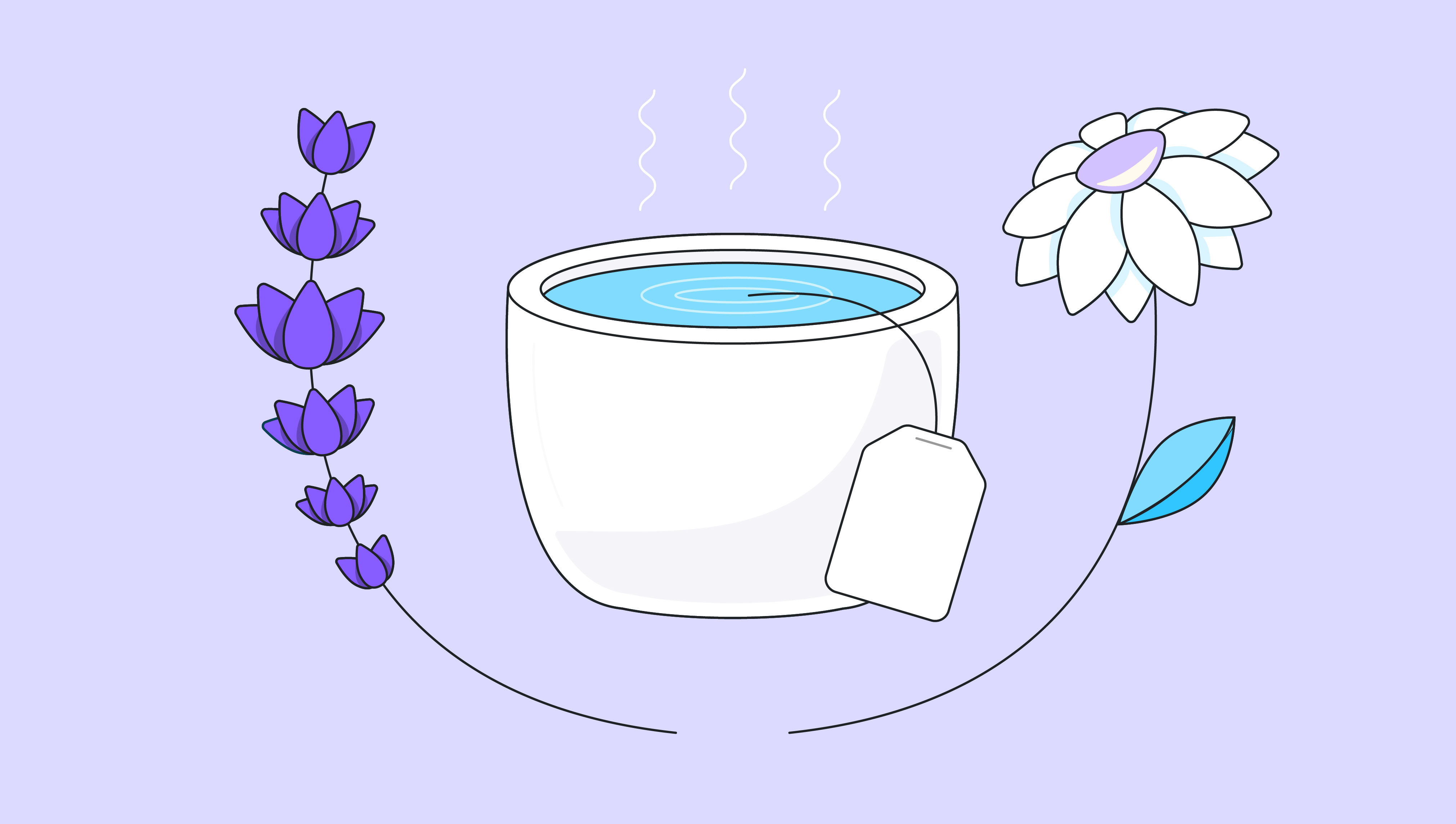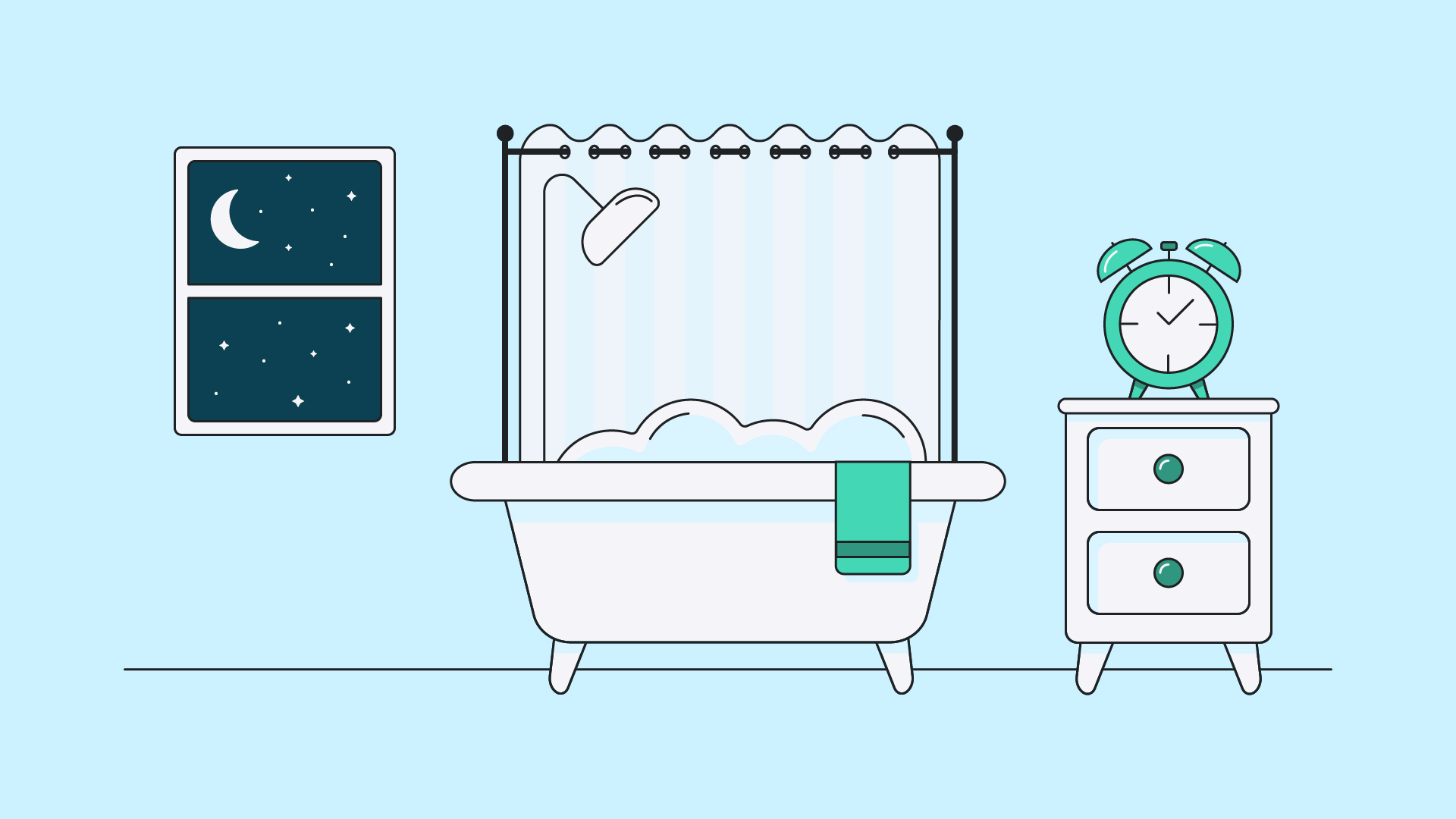
Best Natural Sleep Aids
Michele Roberge, RPSGT, R.T.
Michele Roberge is a Registered Polysomnographic Technologist and a Registered Radiologic Technologist. She also serves on the board for the Florida Association of Sleep Technologists (FAST).
Getting an adequate amount of restful sleep is necessary to live a happy and healthy life. Unfortunately, nearly 60 million Americans report having trouble sleeping on a regular basis.
With so many people struggling to get a good night’s sleep, the sleep supplement business is booming. However, before you opt for melatonin supplements or over-the-counter sleep aids, try natural remedies first.
In this guide, we cover our recommended herbal supplements and healthy bedtime habits to help you get better sleep.
1. Chamomile
Chamomile has been used for centuries to combat anxiety, depression, and sleep disorders such as insomnia. If you regularly have trouble getting good sleep, incorporate a cup of chamomile tea into your bedtime routine.
Chamomile is rich in apigenin, an antioxidant with calming effects. Antioxidants are your body’s clean-up crew, they remove toxins and fight off illness. When you consume foods rich in antioxidants, such as chamomile tea, they initiate this clean-up process. Antioxidants alone can make you feel drowsy because they use a lot of energy to expel toxins from your system.
Drinking a cup of chamomile tea can decrease levels of anxiety, induce drowsiness, and promote undisturbed sleep.
2. Valerian Root
Using the Valerian root for sleep dates back to World War II when it was commonly used in both the US and Europe to decrease anxiety and combat sleeplessness.
Valerian root can help you sleep better by raising your gamma-aminobutyric acid, or GABA, receptor levels. This neurotransmitter decreases neuron activity in the brain, quiets the central nervous system, and boosts drowsiness to help you sleep soundly.
Increased levels of GABA can promote sleepiness and help you get peaceful sleep. Prescription sleep medications such as Ambien and Xanax contain large amounts of gamma-aminobutyric acid— this is how they help you fall asleep faster and stay asleep longer, but they come with many side effects.
Instead, try Valerian root or foods rich in magnesium to raise your GABA levels.
3. Magnesium
Magnesium is one of the most common minerals on Earth and has been regarded as one of the best natural sleep aids. Because magnesium is found in so many foods, you can get better rest just by incorporating sleep-promoting foods into your diet.
So, how does magnesium improve your sleep?
Magnesium binds to GABA receptors to calm your mood, lower stress levels, and help you unwind for sleep.
Additionally, magnesium plays an integral role in regulating neurotransmitter activity and melatonin production. Melatonin controls your circadian rhythm, otherwise known as your sleep-wake cycle. As you can imagine, this process dictates when you fall asleep and when you wake up.
Consuming adequate amounts of magnesium maintains your sleep-wake cycle and ceases sleep problems.
4. Lavender
Lavender is well-known for its relaxing properties. Its scent is instantly calming— it’s not uncommon to see lavender essential oils, shampoos, lotions, candles, and bedtime teas sold as a solution to restless nights.
Lavender is a natural sedative and therefore plays a significant role in calming your nervous system. In recent years, doctors have used lavender to help alleviate the symptoms of and even treat certain neurological disorders.
Like magnesium and valerian root, lavender binds to your GABA receptors to reduce nerve activity and bring about sleep. Specifically, lavender promotes deep, reparative sleep.
Aromatherapy using lavender essential oils has proven effective in inducing relaxation and sleepiness because it helps your mind and body unwind. However, you can take it a step further and enhance the benefits of this herb by drinking it as a bedtime tea.
5. 5-HTP
5-HTP, otherwise known as L-5 hydroxytryptophan, is a naturally-occurring chemical in your body. You’ve likely heard of tryptophan promoting sleep, as it’s commonly associated with the drowsiness you feel after Thanksgiving turkey dinner.
Eating foods high in tryptophan, such as turkey dinner, can help you feel sleepy fast and increase your overall sleep time.
Once ingested, your body turns tryptophan into serotonin. Then, serotonin is converted into melatonin to help you fall asleep. 5-HTP is the key to making all of this happen, as it’s the primary chemical that transforms tryptophan to serotonin.
Until 1995, 5-HTP was available only by prescription until the FDA approved it as an over-the-counter supplement. Today, the supplement is synthetically made using the seeds of an African plant.
For this reason, we recommend trying to incorporate for tryptophan-rich foods into your diet instead of sourcing this amino acid through a supplement.
6. Lemon Balm
Lemon balm is a sleep-inducing herb used to counteract restlessness since the Middle Ages. As you can likely guess, it has a strong citrusy scent, which many people find calming.
Most often, people enjoy lemon balm tea to improve their sleep. However, lemon balm essential oils can be used for stress-relieving aromatherapy, too.
Once ingested, lemon balm increases GABA levels, which boosts drowsiness to promote peaceful sleep.
7. Jujube
The Jujube plant is packed with nutrients and has been used for centuries as a natural remedy to a variety of health issues. Jujube berries can ease gastrointestinal problems, boost heart health, reduce stress, and protect against harmful cancer cells. Plus, jujube berries can fight insomnia.
Jujube berries act as a sedative and contain two phytochemicals— saponins and flavonoids. These silence neuron activity and induce drowsiness to help you fall asleep faster and stay asleep throughout the night.
Both of these phytochemicals have been shown to increase sleep time in slow-wave and REM sleep, too, which are the most restorative stages of sleep.
8. L- Theanine
L-Theanine is a sleep-inducing amino acid found naturally in tea leaves. If you like to end your days with a cup of bedtime tea, L-Theanine is what calms your mood and helps you relax. This amino acid does a few things to help your brain unwind.
For starters, L-Theanine increases serotonin, dopamine, and GABA levels, while decreasing levels of chemicals associated with stress and anxiety. Plus, this amino acid triggers the release of alpha brain waves— these are present during REM sleep and promote relaxation.
9. Kava
Kava has been used for hundreds of years as a stress-reliever. Today, many people use the kava plant to alleviate symptoms of anxiety and promote a state of relaxation.
The kava plant contains compounds called kavalactones. These have sedative properties, which give kava its sleep-promoting benefits. Kavalactones bind to different neurotransmitters, including GABA receptors, to decrease brain activity and cause you to feel sleepy.
In addition to using kava as a sleep aid, many use it as a substitute for anti-anxiety medications.
10. Passionflower
Passionflower is powerful for alleviating symptoms of anxiety and inducing a sense of calmness to help you get better sleep. Like a lot of the natural remedies we’ve discussed, passionflower works primarily by increasing GABA levels and decreasing brain activity.
Many sleep studies have found drinking passionflower tea before bed for only seven days can help you get more restorative sleep. Plus, combining passionflower and valerian root tea has proven more effective than other prescription sleep aids at improving sleep quality— without the unpleasant side effects.
Are Melatonin Supplements Safe?
Simply put, no. Plus, we should mention, it’s never recommended for children to utilize melatonin supplements. Melatonin influences the production of estrogen and testosterone, so supplementing with it can have adverse effects on the body.
As we mentioned earlier, melatonin is a naturally-occurring hormone responsible for regulating your sleep cycle. Melatonin is used to combat a variety of sleep disorders from insomnia to jet lag to restless legs syndrome.
The presence of sunlight directly influences melatonin production. At night, your body senses a lack of light and produces melatonin for sleep. When the sun rises, your body ceases melatonin production to energize you for the day.
When your sleep habits are thrown out of whack, using melatonin supplements to get yourself back on track may seem simple enough. However, it’s not the most effective way to deal with your sleep problems and can have some unpleasant side effects. What’s more, studies have shown there is no confirmed sleep benefit to using melatonin supplements. You’re better off eating foods containing melatonin or adopting healthier sleep hygiene habits.
Side Effects of Melatonin
There is no set dosage for melatonin, which makes it tricky to pinpoint precisely how much you need. Sleep specialists recommend taking anywhere between .3 and 1 mg. However, many melatonin supplements are sold in doses much higher than that.
Melatonin is not regulated as well as it could be. The FDA defines melatonin as a dietary supplement rather than a drug, meaning these supplements do not have to be monitored as strictly as other sleeping aids do. Synthetic melatonin brands are not required to include any overdose risk information on their bottles, and their dosages are not controlled. The amount of melatonin in one pill may be different than another, making it hard to gauge how much you’re consuming.
Using melatonin for sleep is a slippery slope— too much, and you’ll feel foggy, nauseous, dizzy, and fatigued the next day. Plus, sleep specialists have found that long-term use of melatonin supplements can diminish natural hormone levels and lead to more severe sleep issues.
Use Light Therapy to Improve Your Sleep
 If poor sleep habits, shift work, or a vacation has your sleep schedule thrown off, use light therapy instead of melatonin to improve your night’s sleep. Melatonin can be habit-forming and acts as a band-aid to help you (possibly) get better sleep in the short-term, whereas light therapy helps correct the problem at the source.
If poor sleep habits, shift work, or a vacation has your sleep schedule thrown off, use light therapy instead of melatonin to improve your night’s sleep. Melatonin can be habit-forming and acts as a band-aid to help you (possibly) get better sleep in the short-term, whereas light therapy helps correct the problem at the source.
At night, keep the lights low and limit blue light exposure in the hours leading up to bedtime. Your body starts producing melatonin about two hours before you finally doze off to sleep— bright lights, TVs, and smartphone screens can impede this production and postpone your bedtime.
Then, in the mornings, try to get sunlight as soon as you roll out of bed. If you like to work out in the mornings, sleep specialists have found a morning run in the sun can not only reinforce your sleep-wake cycle but also promote deeper sleep cycles. However, if you’re not one for some AM cardio, merely sitting outside or turning on all of the lights can help wake you up and tell your body it’s a new day.
Why are OTC Sleeping Pills Unsafe?
If you’re struggling with a lack of sleep, it may seem easiest to find an over-the-counter sleep aid at your local pharmacy. While these may do the trick in the short-term, they’re not a long-term solution. These can also mask the root of your sleep troubles, making it harder to find answers and effectively treat the issue.
Antihistamine is the leading ingredient in any over-the-counter sleep aid. A sedative, antihistamines can make you feel tired, groggy, dizzy, nauseous, off-balance, and forgetful. While these may help you fall asleep faster, they usually result in moderate to severe drowsiness the following day.
Over time, OTC sleep aids can result in recurring headaches and daytime fatigue. Besides unpleasant side effects, there are other serious risks to using these sleep aids.
It’s not uncommon for people who habitually use OTC sleep aids to build a tolerance to them or even become dependent on them. As time goes on, you’re relying on and ingesting more medication to help you fall asleep at night. This makes stopping difficult.
Many people who habitually use over-the-counter sleeping pills experience nausea, sweating, and shaking when they try to quit. Plus, their sleep problems usually come back in full force.
“When addressing troubles with sleep, the use of sleep medications should be a last resort. Whether the sleep aids are over the counter or prescribed, they are likely to have several undesirable side effects,” says Michele Roberge RT(R), RPSGT. “Sleep hygiene should be the first thing to be evaluated. Small changes to an individual’s bedtime habits can lead to drastic improvements in the quality of sleep. Implementing the use of natural sleep aids such as chamomile and lavender can also be beneficial to sleep without the adverse side effects seen with sleep medications.”
While over-the-counter sleep aids are not necessarily safe for anybody to use, they can be especially dangerous for some. These supplements can interact with a variety of different medications, including other sedatives, and drug interactions can be harmful or potentially fatal. Before buying any OTC sleep aids, consult with your doctor about the medications you’re currently taking.
Healthy Bedtime Habits
Practicing good sleep hygiene and developing a healthy bedtime routine can drastically improve your quality of sleep. Your body wants routine. Giving it the routine it wants helps keep your systems in sync and prevents sleep troubles down the line.
Develop a Routine
To get the most restful sleep, you should go to bed and wake up at the same time every single day— even on your days off. When your body gets in the habit of falling asleep and waking up at a particular time, it’ll train your internal clock to do so naturally. Eventually, you’ll find yourself feeling tired around the same time every evening and waking up before your alarm even buzzes.
In the evenings, you should develop a before-bed routine and stick with it. This routine doesn’t have to be anything over the top, but rather a few things you do nightly before you head off to sleep. Over time, your brain will start to associate these things with sleep, and you’ll be feeling drowsy before you’ve laid down in bed.
Shower Before Bed

If you don’t already shower before bed, introducing one to your nightly routine can be the difference between a night of tossing and turning and sound sleep.
Apart from refreshing you after a long day, a hot bath or shower can improve sleep latency. As you fall asleep, your body temperature drops a few degrees to prompt melatonin production.
Taking a hot shower increases your internal temperature for a short time. However, as soon as you step out and the water dries, your body temperature drops back to normal levels. The drop in temperature after leaving the shower helps your body temperature continue to decline for sleep; this helps you feel drowsier and doze off sooner rather than later.
Be Mindful of Meals
What you eat and when you eat it can make or break your night’s sleep. As you can imagine, some foods are healthy to eat before sleeping, and others not so much.
A good rule of thumb is to stop eating at least two hours before bedtime. If you like to snack in the evenings, keep it small and light. Snacks like yogurt, almonds, and antioxidant-packed berries can help you doze off in no time.
When it comes to dinners, try to incorporate sleep-inducing foods into your meals. Swapping red meats for fish and greasy fries for whole grains can help tire your body out and ready it for sleep.
Are You Ready to Get Better Sleep?
Sleep is necessary to live a long, healthy life. Letting sleep issues fall to the wayside and accruing a substantial sleep debt can lead to high blood pressure, heart disease, and other serious medical conditions later on down the line.
Addressing your sleep troubles with natural sleep remedies is the best way to start improving your sleep quality. However, please note our suggestions are not a substitute for medical advice. If you’re still experiencing restless nights and feel you may have a more severe sleep disorder, we recommend speaking with your doctor.

Comments (1) Leave a reply
Hmm …
I was relieved after I read all the best solutions on sleeplessness where my wife was having it for a long time now. Gradual steps and observations were applied and seemed to be effective.
The funny thing happens, say when my wife suffers from such sleepnessness … me too got there too! Hahaha
Anyhow, I am so thankful about the inputs you have provided.
More Power and God Bless !